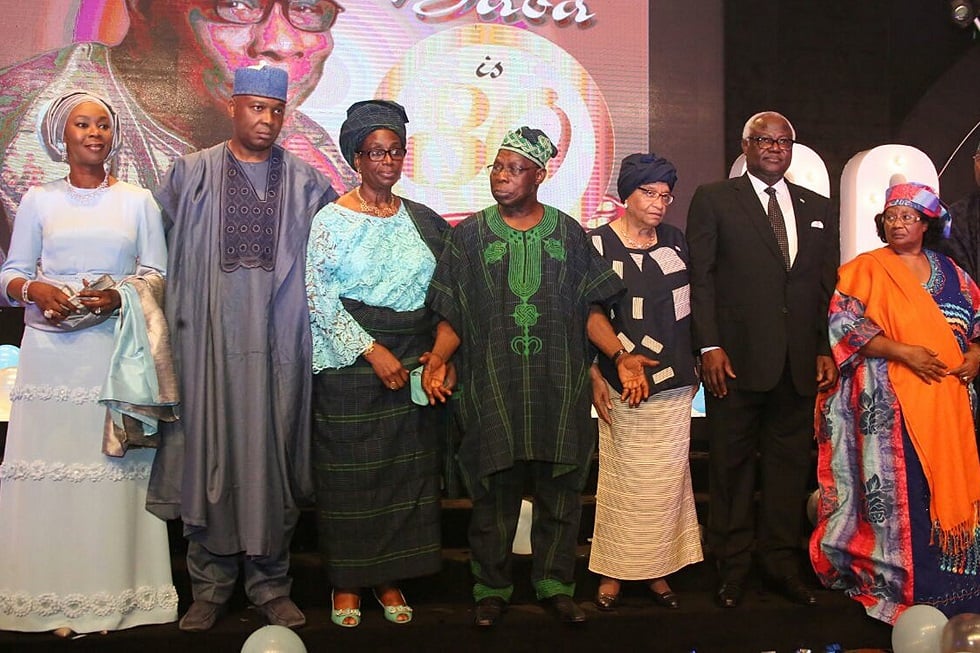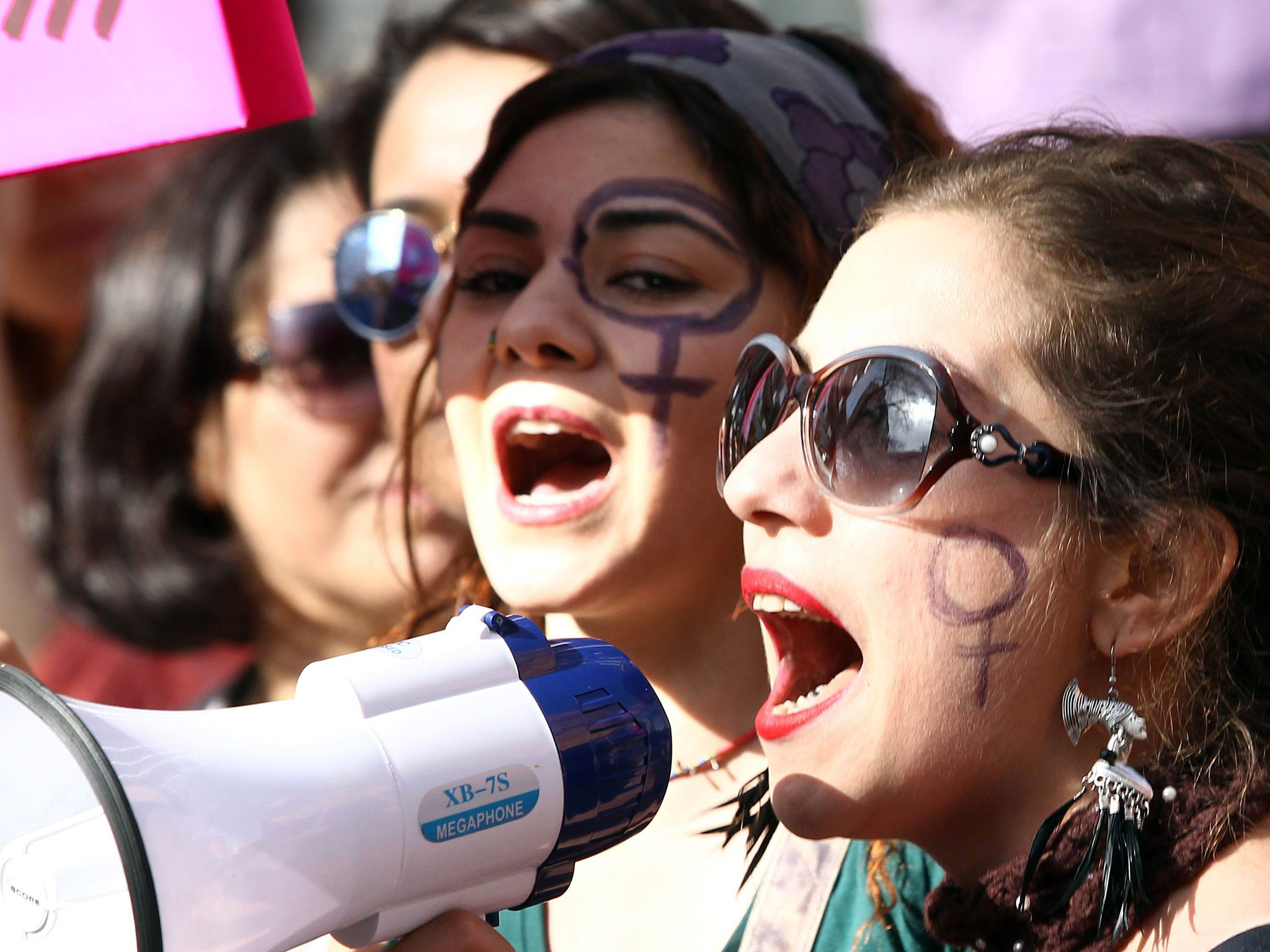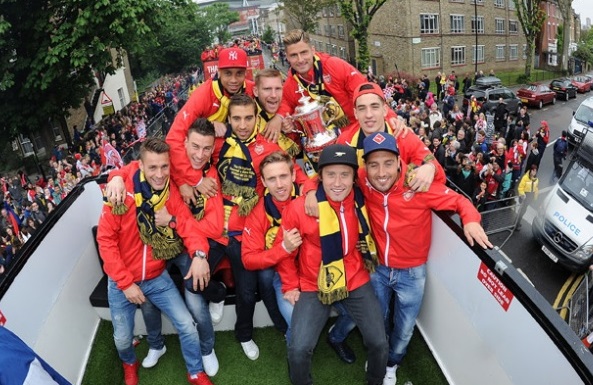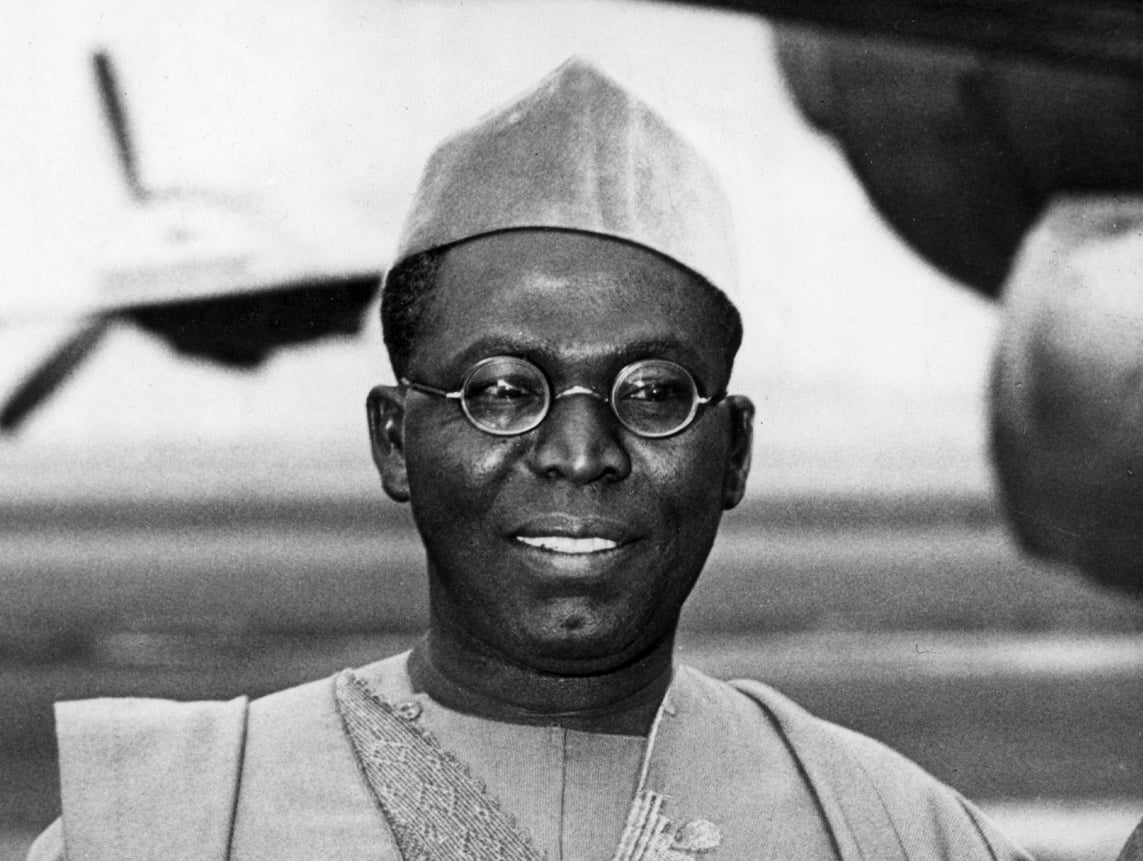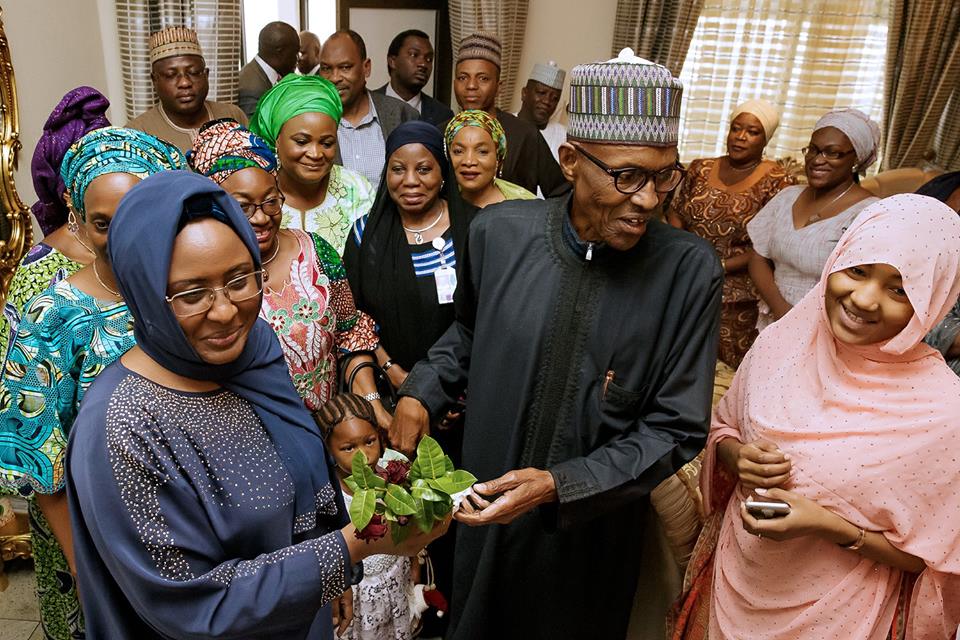From left: Wife of the Senate President, Mrs. Toyin Saraki and husband, Bukola; Wife of the Former President, Bola and her husband, celebrant, Chief Olusegun Obasanjo; President of Liberia, Mrs. Ellen Johnson-Sirleaf; President of Sierra-Leone, Ernest Bai Koroma and Former Malawi President, Dr. Joyce Banda; at a dinner party hosted on Sunday at Eko Hotels and Suites in Lagos to celebrate President Obasanjo at 80 by his friends
BY MUSA SIMON REEF
No trumpet was blown when a child was born to illiterate and poor parents from the backwoods of Ibogun-Olaogun in Ogun State on March 05, 1937. There was nothing to reveal that this young child, whose later dream was to be a mechanic, would cast defining moments in the life of a nation. Presently, wherever two or three people are gathered, when the name of that child that was christened, ‘Olusegun Obasanjo’ is mentioned, disagreement is bound to occur. To his admirers, Obasanjo is that iconic figure that has left positive profound impacts on the nation. Baba, as they fondly call him, believes in the Nigerian project and is willing to lay down his life for it. To his opponents- and he is blessed with so many, the Ota Farmer is a wicked personality who is unforgiving of an offence. Obasanjo, his foes alleged, is not a promise keeper and famous at destroying others to advance his interest. Once he starts a war with anyone, he does not let go until he crushes his enemies.
Since coming to political limelight, after the assassination of General Murtala Mohammed on February 13, 1976, Obasanjo’s paradoxical traits of good and evil have portrayed him as a national preposterousness. Of all the Nigerian leaders, both living and dead, the poor boy from Ibogun-Olaogun, who ran against the traffic of greatness as a youth, is the most favoured by the gods. His only dream was to become a mechanic/lorry boy, but Obasanjo ended up ruling Nigeria for over 11 and half years: three and half years as Head of State and eight years as a civilian president.
Less than 18 years after he enlisted in the army, he rose to become Head of State and Commander-in-Chief of the Nigerian Armed Forces. With destiny shooting him to the corridors of power at 39, Obasanjo pushed for the successful transfer of power to the civilians1979. In retirement at the young age of 44, Obasanjo returned to the farmland from where he was raised to set up Ota Farms. However, he soon discovered that growing crops and raising animals were too dull a routine for a former military leader. He launched into writing and churned out several books that sparked national controversies. While critics accused him of self-adoration in some of his books, nevertheless, they became national bestsellers. Some of the contentious books included, ‘My Command’, ‘Kaduna Nzeogu’ and ‘My Watch.’
Obasanjo, who holds the traditional title of ‘Balogun of Owu’ and ‘Ekirin Balogun of Egba Clan in Yorubaland,’ is never diffident of engaging in controversies. He even sought to create one when none existed. He soon became a literary terror and national conscience for good governance. Governments after his became apprehensive of his criticisms and wondered, “What Obasanjo was always looking for”. He wrote letters to Nigerian leaders, including President Shehu Shagari, General Ibrahim Badamasi Babangida, General Sani Abacha and Dr Goodluck Jonathan whom he supported for presidency in 2011. Unlike others, President Umaru Musa Yar’Adua was bedridden and sick in Saudi Arabia to read a mail. But when in January 2010 the Egba Chief called on the ailing president to resign if he was incapable of discharging his oath of office; it became a defining moment that ultimately led to the passage of the Doctrine of Necessity by the National Assembly that ushered in the Jonathan presidency.
Advertisement
I first saw Obasanjo as a child in 1979 when he paid a farewell visit to Sokoto State, few months to his formal handover of power to President Shehu Shagari. As a pupil of the Army Children School, Sokoto, I was among those who were heartily ferried to welcome him at the airport. Together with other pupils, I dutifully waved the Nigerian flag on that dusty but sunny day that is etched in my memory. I remembered screaming my lungs out at the sight of his big tummy, the red insignia around his neck, the rank on his shoulders and the medals on his chest. His sight gave me hope that someday I may just be like him if I read hard. When he came closer to us, he advised us to read our books so that we can become tomorrow’s leaders. Without education, he said, the future was dim. In later years, I would discover that Obasanjo never told us the complete truth about the capacity of education to uplift us from our pitiable and economically powerless conditions.
I would again encounter the old soldier as an advocate of good governance in February 1994 as a reporter working for ISSUES, a Kaduna-based weekly magazine. He had then acquired notoriety for scolding Nigerian leaders for coming short of global governing standards. Following the decision by General Abacha to convene a Constitutional Conference in 1995, clouds of frightening vagueness had enveloped the political atmosphere. With the Northern military cabal, led by Abacha, forcing Chief Ernest Shonekan out of power as Head of the Interim National Government (ING), the nation returned to the abyss. In a bid to find a way forward, the Arewa House, in its maiden Sardauna Memorial Lectures series, organised a national workshop on February 2-3, 1994 on the theme: ‘Nigeria: The State of The Nation And The Way Forward.’ The event, which took place at the General Usman Katsina House, Kaduna, had Obasanjo as Guest Speaker and General Muhammadu Buhari as Chairman of the occasion.
As the guest speaker, the international statesman, who had failed in his bid to become the United Nations Secretary General, did not fail to thrill his audience with the usual narrative of castigating the IBB regime that had found continuation in Abacha. He called on Nigerians to rise up and confront the common evil of military dictatorship, just as he accused IBB’s disciple (Abacha) of playing pranks with Nigeria’s fortunes. He condemned those who had embraced the option of silence for fear or financial gains. When the dark-goggled military leader reacted, Obasanjo was roped in a coup plot many alleged never existed. The world rose in his defence, but Abacha stood his ground. When it seems that twilight was about to set on the Accuser Of Every Government In Power (AEGIP), God’s finger touched Abacha and he exited mortality.
Advertisement
After Abacha’s death in June 1998, General Abdulsalam, whose retirement papers were on Abacha’s table awaiting approval, took over and quickly set in motion a hurried agenda for the return of democratic rule. Granted presidential pardon, and pressured upon to contest the 1999 presidential election, the former accuser of military regimes initially dawdled, but was later convinced to throw his hat in the ring. He would, thereafter, spend eight years as president. When some supporters, under his promptings, commenced campaigns to amend the constitution to pave way for third term agenda, an angry nation rose up in unison, and the plot expectedly died on the floor of the Senate.
Obasanjo’s comeback in 1999 provided an opportunity that opened up the country for international friendship and brightened prospects for national development. After long years of military rule, the Ota Farmer, like Nelson Mandela of South Africa, was upbeat in leading his country out of the woods. With the prices of crude oil soaring at the international market, May 29, 1999 represented a new dawn and a refreshing hope for a people that have grown weary and wary of military politics.
Between 2001 and 2003, I covered the State House for the defunct National Interest and BusinessDay. Whe
In the history of the country, there has been no Nigerian more qualified to serve as President than the Egba Chief. Many hoped that his comeback to the corridors of power would unleash a new vision on the citizens and move the country from its self-inflicted problems. To consolidate democracy and remove all threats, he sacked military officers who had held political offices. The North protested, but Obasanjo the patriot had his day. He introduced monetization policy to reduce waste in the public service. Houses built by the Federal Government were sold to civil servants, just as the tenure policy, which many had alleged was against the North, was introduced in the public service. Under Obasanjo’s comeback period, the country experienced some of the best of times in improved living standards.
Advertisement
If the initial years had shown signs for a better tomorrow, his obsession with tenure elongation incinerated noble plans he had for the nation. Obasanjo’s human rights records were adjudged the worst, following the military killings in Odi, Bayelsa, and Zaki Biam in Benue. Under the watch of the Balogun, the nation’s chief law officer, Chief Bola Ige, was murdered. Till the expiration of his eight-year reign, there was no clue to unravel those behind the dastardly killing. Chief Harry Marshal was cold bloodedly murdered in March 2003, just as Chief A.K Dikibo could not escape the gunmen in February 2004.
The zeal to fight corruption through the establishment of Independent Corrupt Practices and Other Offences Commission (ICPC), as well as Economic and Financial Crimes Commission (EFCC), was only matched by the subterranean deployment of N10 billion as gratification for lawmakers to amend the constitution and allow him go for a third term in office. Though Obasanjo denied allegations of tenure elongation project, Senate President Ken Nnamani alleged that the Balogun personally confided in him on the matter. Former US Secretary of State, Condoleezza Rice, in her autobiography, quoted Obasanjo as telling President Bush of his intention to amend the constitution in favour of tenure elongation. Bush, according to the book, was livid with disbelief and wasted no time in telling his guest to perish the thought. If Nigerians were in doubt of the third term project, Malam Nasir Ahmed El-Rufai’s ‘Accidental Public Servant’ exposed the underbelly of Obasanjo’s quest to extend his stay in power.
In a media interview to celebrate his 80thbirthday, the former president said, “I have nothing to offer Nigeria other than leadership.” Indeed, if the present reality facing the country is anything to go by, then, the leadership as provided by Obasanjo has failed in transforming the country. Obasanjo’s form of leadership only preyed on national resources to advance personal interest. The resort to crocodilian posturing and weakening of political opponents were hallmarks of the Obasanjo years, with the nation’s commonwealth sold to fronts under a dubious privatisation programme.
How then can one explain Baba’s ownership of a private primary, secondary and university? What business was the Balogun involved in? Was his Ota Farm Ltd buoyant enough to provide funds for the establishment of such institutions? As State House correspondent, I was aware that, contracts for the supply of chickens and turkeys during Christmas and New Year celebrations were awarded to his farm. Was there any competitive bidding from others for such contracts? If the answer is in the negative, could that be the hallmark of a transparent government headed by an advocate of a corrupt-free society? Many governors, afraid of being harassed by the Malam Nuhu Ribadu-led EFCC, fell over one another to donate millions of Naira to the Obasanjo Presidential Library project. As it stands, the project is seen by his opponents as a symbol of fraud, steeped in extortion.
Advertisement
As vanguard for democracy, many Nigerians had expected Obasanjo to work towards deepening the rule of law. It is on record that Obasanjo fought members of the National Assembly from the first day he assumed powers until the last day when he handed over power in May 2007. Under his watch, Nigeria produced five Senate Presidents. He was known to have ensured forceful resignation of Chairmen of his ruling Peoples Democratic Party (PDP) at the slightest provocation. He appointed advisers and told them he was not under compulsion to take their advice. He waged a relentless war against governors perceived to be against his interest and plotted the removal of DSP Alamieyeseigha of Bayelsa, Ayo Fayose of Ekiti State and Chief Joshua Dariye of Plateau State. Though seen by the outside world as a democrat, the General who received the instruments of surrender from Biafran secessionists ensured the crippling of opposition politics within. He recruited governors from the opposition parties as spies, who were too willing to do his biddings in order to be free from the radar of anti-graft agencies. Obasanjo’s own brand of democracy was laced with gun politics. Despite his track record as advocate of transparent governance, he came short of what he accused others of doing and caved in to pressures from lackeys. The nation was appalled when government lawyers entered a nolle prosequi in a corruption deal involving the permanent secretary of the Ministry of Defence, Dr. Julius Makanjuola, in 2004. The technocrat was later sacked and the case laid to rest. In power, the old soldier refused to forget the way military resolves conflicts. He deployed brute force to meet violence and never forgot the maxim of old soldier that, when violence meets violence, superior violence triumphs. Some of the horrifying and hair-rising killings by the military are grim reminders that the old soldier was incapable of unlearning his old ways.
Before his watch, billions of Naira appropriated for projects developed wings. Before the 2003 polls, about N400 billion earmarked for road construction under Chief Tony Anenih (Mr Fix It) disappeared without any trace. Attempts by the House of Representatives to commence probe of the missing funds met a brick wall. Speaker Umar Ghali Na’Abba paid dearly for standing up against the Balogun when he was denied ticket to return to the House in 2003. The National Assembly indicted both Obasanjo and his deputy, Atiku Abubakar, in the Petroleum Technology Fund (PTF) scam running into several billions of naira. The lawmakers frustrated moves by Obasanjo to buy a used jet at an outrageous price. His relationship with Atiku nose-dived and went down irreconcilable path, following disagreement over tenure elongation.
Advertisement
As the former president celebrated his 80thbirthday on March 5, 2017, the man himself bemoaned the lack of leadership, citing it as the nation’s bane. Though he attempted to exculpate his generation from present leadership deficit, many Nigerians are convinced that the Balogun is part of our problem. The former president is still relevant to the extent that every political group plotting to wrest power must ask itself: “What role will Baba play?” Ignoring Obasanjo in the game of politics in Nigeria can only be done at one’s peril. He remains a political juggernaut whose strength for national mood swing coercion remains unparalleled. There is no way the Egba Chief can absolve himself from the leadership deficits the country has experienced from 1999 to date.
If Obasanjo were to be born in this present time, with the same circumstances that surrounded his birth in 1937 in Ibogun-Olaogun, could this poor Ibogun boy be anything more than a street urchin? With the collapse of public schools, can the poor in present day Nigeria afford quality education that was given to the Ibogun boy at a minimal cost? Our leaders, who are products of public schools have successfully destroyed public schools and replaced them with private schools that are more commercially focused than serving the society. Some common criminals in levers of power have taken over our commonwealth. Opportunities may have reduced, but the vast nation’s resources have been cornered by a greedy leadership. When you have a military officer carting away a whopping sum of N650 million per month for a period of two years, what do you call that? When an officer purchases a house at N350 million for his son that has not earned N10 income, what lesson are you putting up for the future? When $9.8 million belonging to a public servant is found in a slum inhabited by paupers, what system produces such an evil? When you sentence a young man to 24 years imprisonment for stealing 24 cartoons of indomie, and, then, entered into a plea bargain to receive N1 billion from a public servant accused of stealing N100 billion, what type of a country is that? When leadership is silent over the killings of nearly a thousand by herdsmen in Southern Kaduna, but quickly deploys a military force to deal with cattle rustlers, what hope is there for justice? When those who should talk have become willing accomplices of injustice, what type of leadership breeds such a system? When religious leaders are in bed with politicians, what hope is there for the citizens? Obasanjo at 80 is a symbol of Nigeria’s best and worst. He remains the light and darkness of a nation that is perpetually at war with itself. He is the answer and trouble of a nation that has become the shame of the black race. What he built with his right hand, he destroyed with his left. In words, he stands as the shining armour of truth; in action the leadership he symbolises cannot be trusted.
Advertisement
Obasanjo’s leadership is fraught with inequalities and succeeding leaders, who have taken cue from his style, cannot but built their own empires. Obasanjo’s form of leadership sees Nigerians from their Hilltop mansions. Having turned Nigeria into a farm House where less money made from the farm is spent on the labourers, the leaders have ferried a substantial part of our commonwealth to Western countries for their generations yet unborn. Nigeria’s leadership has impoverished the Niger Delta people and deny the vast North of its once flourishing agriculture. The greatest challenge that will soon confront our country is the frustration foisted on millions of our youths who, without jobs, are now mobile dynamites that will soon explode and confront the paradox called Nigeria. These children of the commoners, whose Obasanjo’s leadership has robbed, will one day demand their rights to equality. These children who, despite the acquisition of degrees and diplomas, have now been turned into taxi drivers, security guards, sex toys and hustlers will prove themselves the fitting judgement for a system that has created shrinking opportunities amidst immeasurable resources. I pray, Baba lives long to see that day.
Nigeria has been living a lie. The nation’s leadership, which Obasanjo cannot be excused from, has dealt a deadly blow on the citizenry. In this morning of a new Nigeria that is about to break, the present preying leadership system shall give way to a just system where all, irrespective of ethnic and religious leanings, shall find fulfilment. Obasanjo @80 is still the story of a man and a nation whose hope for a better tomorrow is still enmeshed in the despair of the present. The Egba General may have conquered the military, religious, cultural, economic and political realm for himself, but he has delivered too little to empower and emancipate his countrymen and women from an evil leadership.Considering the good fortunes that have smiled on the Balogun, the gods may have taken shelter under his home and provide him with a protection against plots by his opponents. Unlike King Lear, a Shakespearean character who laments, “As flies to wanton boys are we to the gods, they kill us for their sport,” the Egba Chief seems unperturbed on what human powers can unleash on him.
Advertisement
I joined millions of Nigerians in wishing Baba Obasanjo a happy birthday in arrears, with many strength-filled years to undo the evils of a leadership system that is taking our nation down the slippery slope of self-destruction.
Reef, a media professional, wrote this piece from Abuja, and can be reached on:[email protected]
Views expressed by contributors are strictly personal and not of TheCable.
Add a comment
